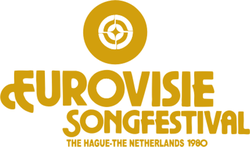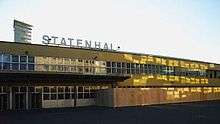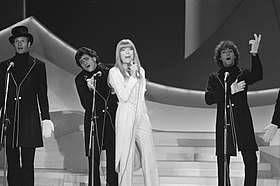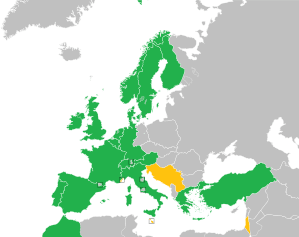Eurovision Song Contest 1980
The Eurovision Song Contest 1980 was the 25th Eurovision Song Contest and was held on 19 April 1980 in The Hague. The presenter was Marlous Fluitsma, although each song was introduced by a presenter from the participating nation. In some cases, this was the same person providing the commentary. The contest was won by Johnny Logan, representing Ireland with a song called "What's Another Year".[1][2]
| Eurovision Song Contest 1980 | |
|---|---|
 | |
| Dates | |
| Final | 19 April 1980 |
| Host | |
| Venue | Nederlands Congresgebouw The Hague, Netherlands |
| Presenter(s) | Marlous Fluitsma Hans van Willigenburg (Green Room) |
| Conductor | Rogier van Otterloo |
| Directed by | Theo Ordeman |
| Executive supervisor | Frank Naef |
| Host broadcaster | Nederlandse Omroep Stichting (NOS) |
| Interval act | The Dutch Rhythm Steel and Show Band |
| Website | eurovision |
| Participants | |
| Number of entries | 19 |
| Debuting countries | |
| Returning countries | |
| Non-returning countries | |
Participation map
| |
| Vote | |
| Voting system | Each country awarded 12, 10, 8-1 point(s) to their 10 favourite songs |
| Nul points | None |
| Winning song | "What's Another Year" |
Location

Israel, winners in 1979, declined to host the 1980 show for the second time in a row, as the IBA could not fund another international production, and the Israeli government turned down a request to extend the IBA budget. The European Broadcasting Union also set the broadcast on the same day as the Yom HaZikaron holiday, wherefore Israel decided not to participate. After Spain, the 2nd-place winner of 1979, and reportedly the UK, refused to host, the Netherlands finally agreed to host the show in a small-scale production. According to Yair Lapid, son of Tommy Lapid who was then the IBA director general, Lapid called his counterpart at NOS and convinced him to take the "undesired honour", when he realised that the extra cost could paralyse the regular work of the IBA.[3] As of 2020, this is the last contest that was not hosted by previous year's winning country. The Hague is the seat of government of the Netherlands and the capital of South Holland. It is the third largest city of the Netherlands, after Amsterdam and Rotterdam. Located in the west of the Netherlands, The Hague is in the centre of the Haaglanden conurbation at the southwest corner of the larger Randstad conurbation. The contest took place at the Congresgebouw (presently known as the World Forum). The venue was constructed in 1969 and previously hosted the contest in 1976.
Contest overview
The venue that had hosted the Eurovision Song Contest 1976, Congresgebouw, was chosen. Various parts of the opening sequence and stage of the 1976 festival were reused. Again, Roland de Groot took charge of the design. As with the 1977 and 1978 contests, there were no pre-filmed postcards between the songs, with a guest presenter from each nation introducing the entries. Apart from this, the presenter, Marlous Fluitsma, except for the voting, did not make the presentation in English or French, which means that the presentation was made almost entirely in Dutch. NOS spent just US$725,000 on the project.
After Israel announced its non-participation, Morocco entered into the contest instead. Monaco also did not participate after it did so in 1979.
Australian-born Johnny Logan representing Ireland was the winner of this Eurovision with the song "What's Another Year". This was Ireland's second time winning the competition, having won in 1970 with "All Kinds of Everything", which was also held on Dutch soil.
Germany were runners-up this year. They would finish in second place again the following year, finally winning in 1982. Germany would go on to finish second again in 1985 and 1987, making the 1980s their most successful Eurovision Song Contest decade. After two relatively poor placings, United Kingdom returned to form by coming third.
Format
The scoring system implemented in 1975 remained the same; each country had a jury who awarded 12, 10, 8, 7, 6, 5, 4, 3, 2, 1 point(s) for their top ten songs. However this year for the first time, countries were required to cast their votes in ascending order, 1,2,3 etc. This change made for the added excitement of waiting for each country to award their highest 12 points at the end of each voting round.
Conductors
For each nation's performance, the orchestra was conducted by the following:

















.svg.png)
.svg.png)
Results
Notes
Score sheet
_winnaar_Johnny_Logan_in_aktie%2C_Bestanddeelnr_930-7803.jpg)
The Netherlands gained a strong lead early on, getting the maximum 'douze points' from three of the first four voting countries. This was not to last, however, as Germany and eventually Ireland overtook them.
| Results | ||||||||||||||||||||||
|---|---|---|---|---|---|---|---|---|---|---|---|---|---|---|---|---|---|---|---|---|---|---|
| Austria | 64 | 1 | 3 | 4 | 5 | 1 | 4 | 5 | 6 | 4 | 6 | 3 | 3 | 4 | 10 | 4 | 1 | |||||
| Turkey | 23 | 3 | 12 | 8 | ||||||||||||||||||
| Greece | 30 | 5 | 1 | 2 | 2 | 4 | 3 | 1 | 8 | 4 | ||||||||||||
| Luxembourg | 56 | 1 | 1 | 4 | 6 | 3 | 7 | 8 | 7 | 8 | 3 | 8 | ||||||||||
| Morocco | 7 | 7 | ||||||||||||||||||||
| Italy | 87 | 2 | 6 | 2 | 3 | 10 | 8 | 6 | 2 | 7 | 4 | 12 | 1 | 2 | 2 | 10 | 10 | |||||
| Denmark | 25 | 4 | 2 | 6 | 7 | 1 | 5 | |||||||||||||||
| Sweden | 47 | 8 | 10 | 10 | 6 | 5 | 5 | 2 | 1 | |||||||||||||
| Switzerland | 104 | 6 | 2 | 5 | 7 | 3 | 8 | 2 | 12 | 10 | 10 | 7 | 6 | 10 | 12 | 2 | 2 | |||||
| Finland | 6 | 5 | 1 | |||||||||||||||||||
| Norway | 15 | 4 | 6 | 2 | 3 | |||||||||||||||||
| Germany | 128 | 8 | 10 | 3 | 10 | 12 | 7 | 5 | 7 | 2 | 10 | 8 | 12 | 10 | 5 | 12 | 7 | |||||
| United Kingdom | 106 | 7 | 5 | 8 | 8 | 10 | 12 | 10 | 4 | 3 | 7 | 7 | 5 | 6 | 8 | 6 | ||||||
| Portugal | 71 | 4 | 5 | 4 | 10 | 6 | 8 | 2 | 1 | 8 | 1 | 5 | 6 | 7 | 4 | |||||||
| Netherlands | 93 | 12 | 12 | 6 | 12 | 3 | 3 | 10 | 8 | 2 | 4 | 12 | 1 | 5 | 3 | |||||||
| France | 45 | 3 | 7 | 2 | 1 | 1 | 4 | 1 | 3 | 5 | 4 | 3 | 6 | 5 | ||||||||
| Ireland | 143 | 10 | 12 | 7 | 1 | 12 | 7 | 12 | 8 | 12 | 12 | 12 | 5 | 6 | 8 | 7 | 12 | |||||
| Spain | 38 | 4 | 7 | 8 | 6 | 5 | 6 | 2 | ||||||||||||||
| Belgium | 14 | 3 | 1 | 10 | ||||||||||||||||||
| The table is ordered by appearance | ||||||||||||||||||||||
12 points
Below is a summary of all 12 points in the final:
| N. | Contestant | Voting nation |
|---|---|---|
| 7 | Ireland | Belgium, Denmark, Germany, Greece, Norway, Switzerland, United Kingdom |
| 4 | Netherlands | Austria, France, Luxembourg, Turkey |
| 3 | Germany | Italy, Netherlands, Spain |
| 2 | Switzerland | Finland, Ireland |
| 1 | Italy | Portugal |
| Turkey | Morocco | |
| United Kingdom | Sweden |
Returning artists

%2C_Bestanddeelnr_930-7861.jpg)
| Artist | Country | Previous year(s) |
|---|---|---|
| Katja Ebstein | 1970, 1971 | |
| Maggie MacNeal | 1974 (part of Mouth & MacNeal) | |
| Paola del Medico | 1969 |
Song presenters
Each song was introduced by a presenter from the national country. A few countries used their commentators as presenters (Turkey's radio commentator and the TV commentators of Denmark, Sweden and Finland). The Danish, Norwegian, German, Portuguese and French presenters hosted their countries' respective national finals. Fluitsma wore a different dress when introducing the Dutch entry, rather than having another person introduce that entry.

















.svg.png)
.svg.png)
^All the introductions were made in the language in which the song was performed, with the exception of Ireland. Thelma Mansfield introduced the song in Irish, whereas the song was performed in English.
Commentators
Television

















.svg.png)
.svg.png)
Radio
Some participating countries did not provide radio broadcasts for the event; the ones who did are listed below.













.svg.png)
Spokespersons

















.svg.png)
.svg.png)
National jury members


.svg.png)
References
- "Eurovision 1980 Results: Voting & Points". Eurovisionworld. Retrieved 2018-09-27.
- The Eurovision Song Contest, retrieved 2018-09-27
- Yair Lapid, "Memoires After my Death", Keter Books, Jerusalem 2010 (ISBN 978-965-07-1792-6), p. 239 (in Hebrew)
- "Eurovision Song Contest 1980". The Diggiloo Thrush. Retrieved 4 March 2012.
- Dellanoi, Dietmar (OGAE Austria)
- "Eurovision Song Contest 1980" on IMDb
- Roxburgh, Gordon (2017). Songs For Europe - The United Kingdom at the Eurovision Song Contest Volume Three: The 1980's. UK: Telos Publishing. p. 43. ISBN 978-1-84583-118-9.
- Baumann, Peter Ramón (OGAE Switzerland)
- "Selostajat ja taustalaulajat läpi vuosien? • Viisukuppila". Viisukuppila.fi. Retrieved 2012-08-10.
- Dyrseth, Seppo (OGAE Norway)
- http://www.viisukuppila.fi/phpBB3/viisula/topic8529.html#p1018060
External links
| Wikimedia Commons has media related to Eurovision Song Contest 1980. |

